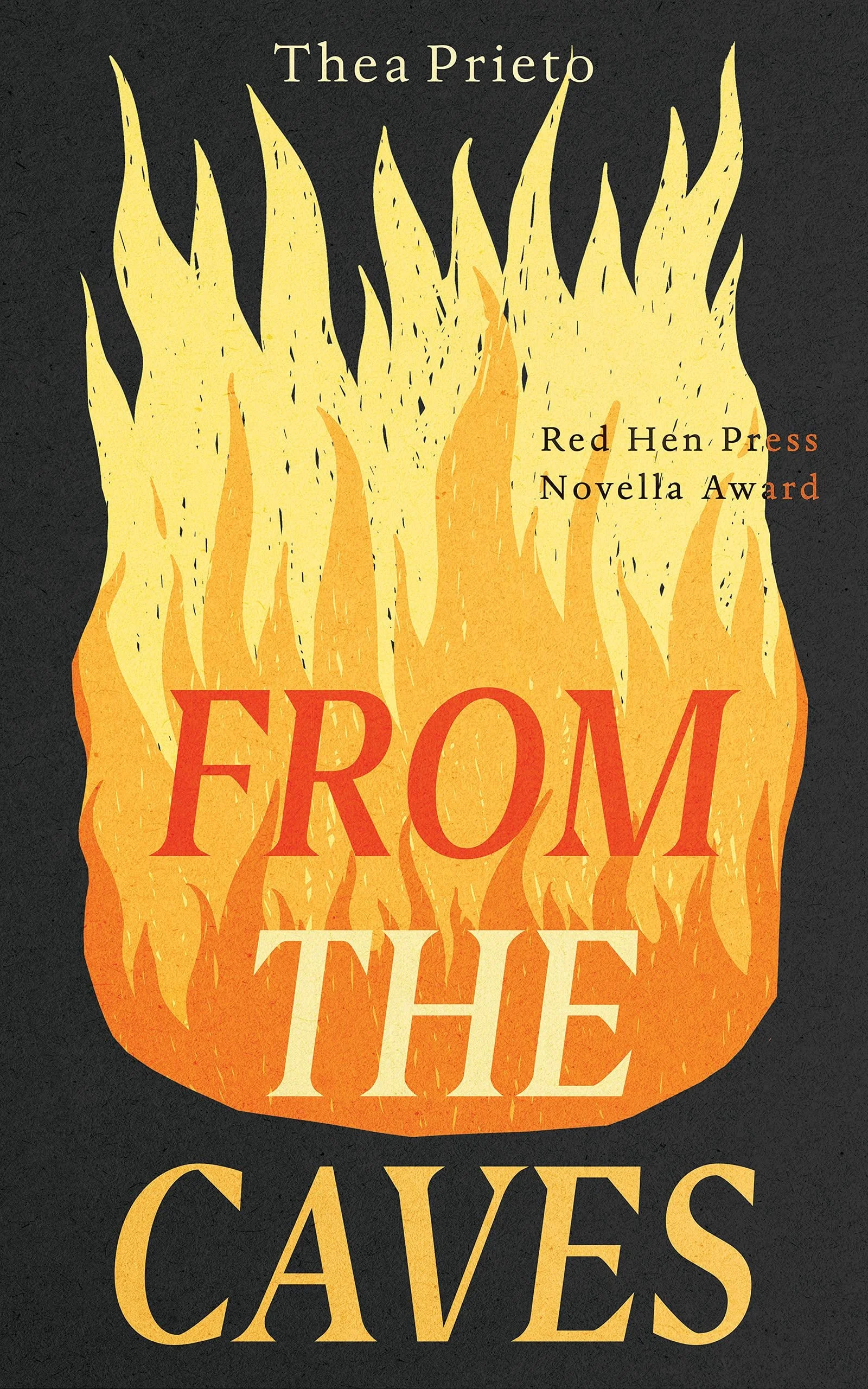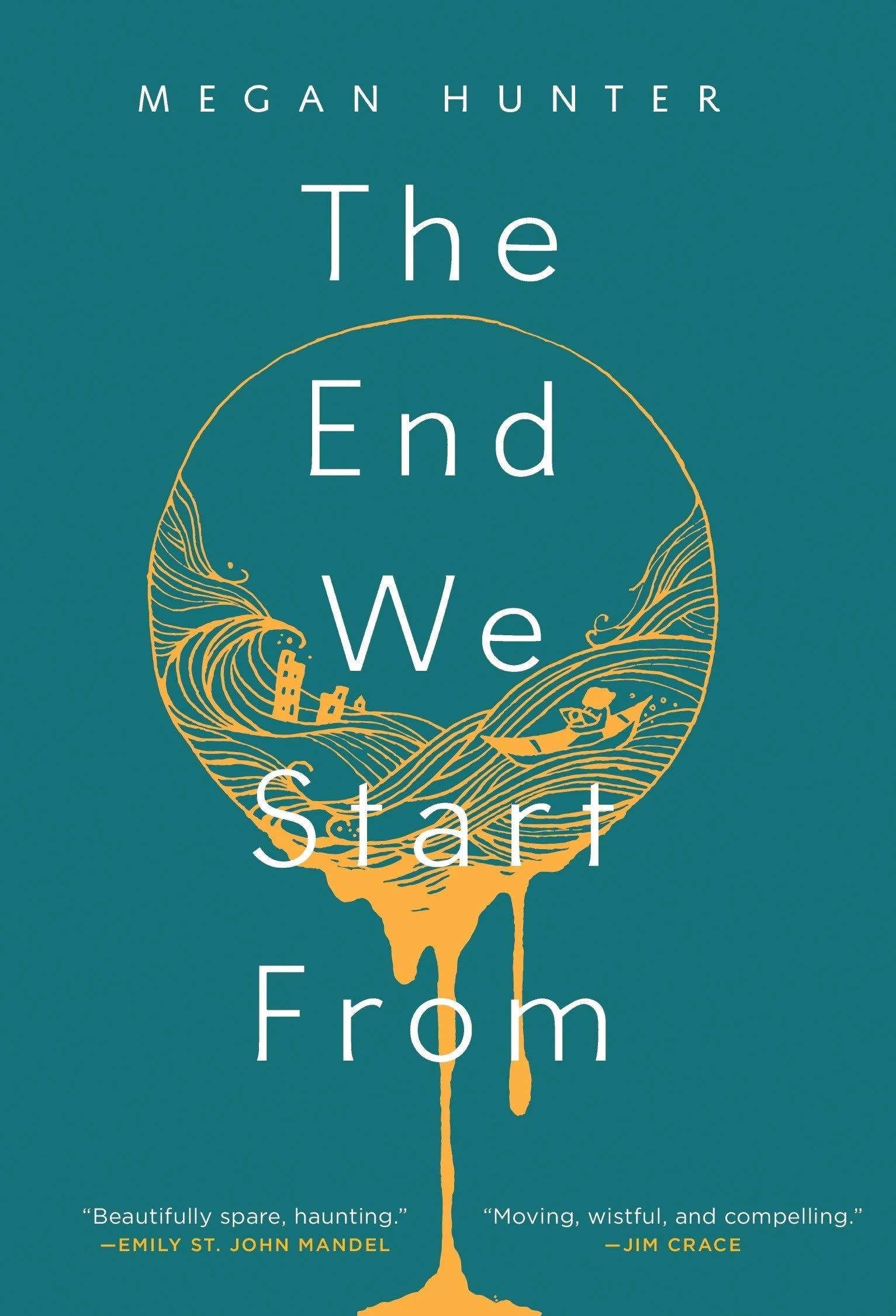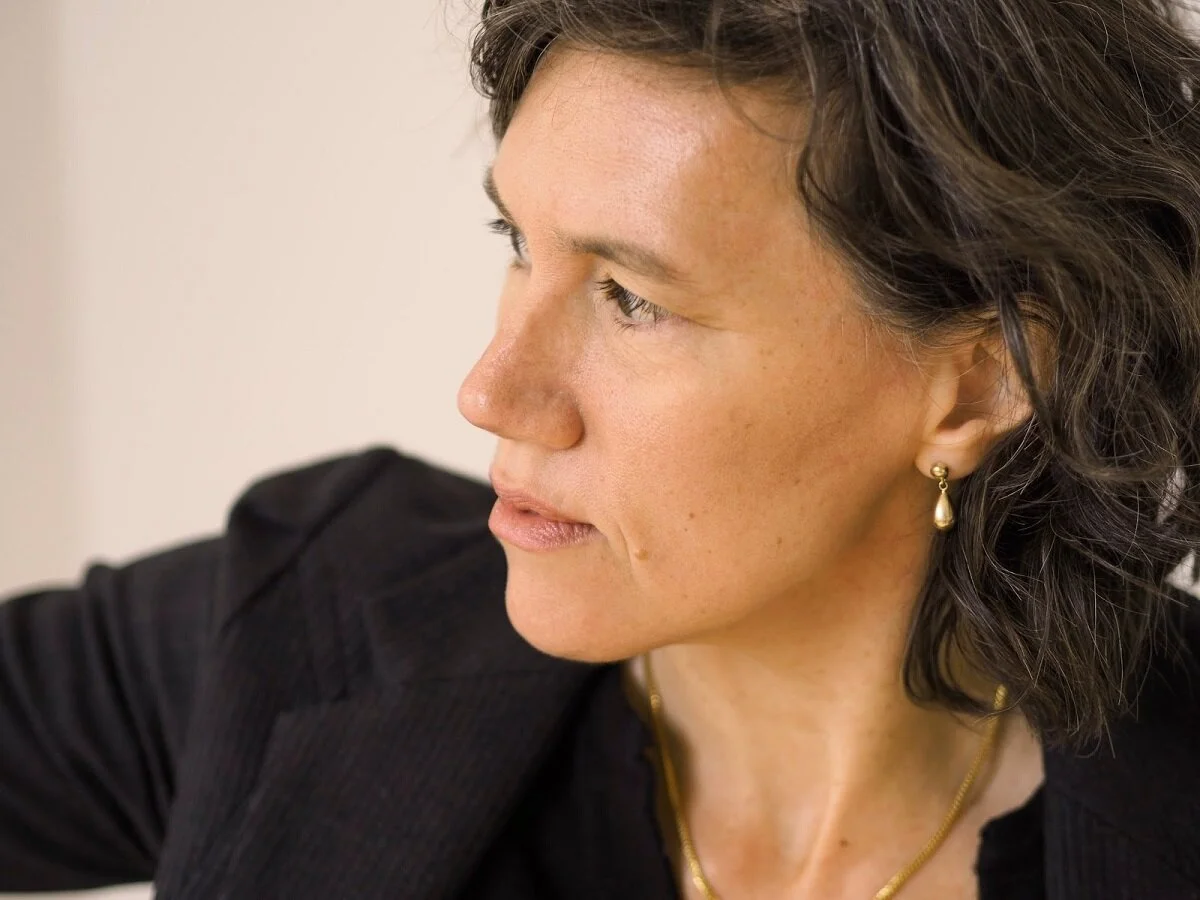A Long-Term Game of Telephone
A conversation with Thea Prieto, author of “From the Caves.”
PROPELLER Q&A
EVENT ALERT: Friday, January 21st, at 3pm Pacific, Thea Prieto, LaVonne Griffin-Valade, and Joshua James Amberson will discuss their work in a Portland State University Creative Writing Program alumni showcase event via Zoom. Register here for the reading.
“From the Caves,” Thea Prieto’s fiction debut, is officially described by publisher Red Hen Press as taking place “after an environmental catastrophe has driven four people inside the dark throat of a cave: Sky, a child coming of age; Tie, pregnant and grieving; Mark, a young man poised to assume primacy; and Teller, an elder, holder of stories. As the devastating summer heat grows, so does the poison in Teller’s injured leg and the danger of Tie’s imminent labor. The future becomes increasingly dependent on the words Sky gleans from the dead, stories pieced together from recycled knowledge, fragmented histories, and half-buried creation myths.” Prieto, who lives in Portland, Oregon, and has edited short fiction featured on this site, chatted with us recently about the genesis of “From the Caves,” her thoughts about climate change, and the ways in which the publishing process has changed her relationship to her own writing.
PROPELLER: From the Caves takes place on an Earth that is almost uninhabitable. You worked on the book for a number of years, and there have been real-life climate disasters consistently throughout that time. How did the climate issues currently occurring inform the way in which you wrote the situation your characters find themselves in?
THEA PRIETO: Climate disasters had a very real impact on From the Caves, especially those on the West Coast—wildfires, drought, dying kelp forests, and the list goes on, unfortunately. Back when I first discovered my characters, I thought I would describe the end of the world, not in a post-apocalyptic way, but as though the planet had reached extreme old age and was dying a natural death. I think I held to that idea because I was still grappling with my own grief—over the death of loved ones, the loss of familiar landscapes—because I wanted death to be natural and for every death, the death of the planet included, to follow the same natural arc.
But time went on and I processed more of my grief through writing, and I came to better understand that my loved ones were dying of illnesses, not old age, my friends were dying from accidents, not old age, and it doesn’t take too many wildfire evacuations to see the world is suffering, and not of old age, but of climate change and human interference. And so I gave up the idea of the world in From the Caves dying of old age, because that's not what was happening around me, it wasn't what I was observing, and instead I began to build up my story world with suddenly not-so-impossible apocalypse scenarios. Inevitably, this decision created a bridge between the story world and the collage of creation myths my characters share with one another, and it helped me explore what is happening now in our present, and better understand how specific individuals might live their lives in the midst of it all.
PROPELLER: There are a number of times in the book that the characters stop to repeat well-worn stories that, for them, seem to serve the purpose of grounding myths. These stories often feature characters or situations that are vaguely familiar, but are never quite the myths or parables our culture repeats. How did you develop the features of the stories your characters tell, and what role do you feel the repetition of stories plays in their—and also, I suppose, in our—lives?
THEA PRIETO: That repetition in my characters’ stories echoed throughout the writing process in interesting ways. By and large, I believe the repetition that occurs in creation myths, both within and across different cultures, reflects humanity’s shared drive to understand the world and our places in it. It’s part of what drew me to the stories in the first place, that common ground in this widespread exploration of natural phenomena. The prevalence of flood mythologies across the planet—not just in wet climates or on shorelines, but also in deserts—is one easily recognizable commonality and connection. I felt the connection, too, when I began investigating these story collectives in my own writing, and when I discovered more opportunities for overlap.
And so for From the Caves, I developed my characters’ oral tradition as though it were the result of a very long game of telephone with various conversation threads bottlenecking at the end of civilization. Determining which aspects of their stories would be repeated or fragmented had largely to do what I felt my characters and their immediate generations wanted or needed from the stories, to make sense of their existence. The stories are primarily employed by my characters as a source of escapism, but also as a source of information that connects them to their past and helps them carry on. In this way, the repetition is an ancient and ongoing form of sustenance, especially in a world that lacks resources.
PROPELLER: Your characters are not only in a world that lacks resources, but in a world that lacks space. From the Caves isn’t a metaphorical title—your characters are forced, due to the climate, to spend most of their time in actual caves. What kind of challenges did this constricted setting and location pose for you as a writer?
THEA PRIETO: The setting posed some interesting challenges from the start, mostly because I began the drafting process excited to experiment with a lot of different writing constraints. One early idea I entertained for From the Caves involved trapping my characters in the cave for the entirety of the story, so that their oral storytelling tradition was their only way and my only way—and also the reader’s only way—to access the characters’ past, their ancestors, and the outside world. The intention was to create a dynamic where the stories-within-stories were the only readily available resource left, making the need to understand the characters’ mythological past on par with staving off starvation.
Thinking about it now, I believe back then I was testing for extreme scenarios that would help me examine what does and doesn’t break when storytelling faces the ultimate pressure of survival. That said, these experiments, though they helped me begin the manuscript, inevitably brought up so many practical questions about how my characters were still capable of breathing that the constraints slowly fell away, sort of like training wheels, because I knew I didn’t want my characters to be wholly metaphorical or philosophical. I wanted them to read like real people with real bodies, and so I placed my characters outside the cave at the beginning and end of From the Caves, leaving only parts of the story devoid of food, water, and light, to force the original imperative.
PROPELLER: Were there other examples of speculative fiction you looked to for direction or inspiration when working on the book? Any authors who had written this kind of material before and whose books or words were able to provide some guidance?
THEA PRIETO: In terms of story constraints, one book that pops immediately to mind is The Plague by Albert Camus, which provided a wonderful and horrifying example of a locked setting, and of the various ways confined characters might react to trauma, or resort to scavenging their beliefs for answers. José Saramargo’s Blindness exemplified similar constraints, and the book also gave me a lot of permission while I was drafting dialogue and manipulating the perspective in From the Caves, as his writing showed me different ways language can—and should—bend to human experience before literary convention.
But I have to say one of the most inspirational texts I read while writing From the Caves was Megan Hunter’s The End We Start From, not only because the book also explores motherhood at the end of the world, specifically through flood mythologies and the idea of water as both a source of creation and destruction, but because our author conversation led me to Penelope Farmer’s Beginnings: Creation Myths of the World. The book is a very short introduction to creation myths from cultures around the world, and every sentence reminded me not only of the human drive to understand our existence and of the creativity in that storytelling, it also reminded me of where I might exist in that tradition and inspired me to continue writing.
PROPELLER: You spoke earlier about the role grief played for you in the development of the book. In the narrative, though, the apocalypse that has occurred—whatever it is—is not recent. Most of the characters only know their world as it currently is, and they move through an array of different attitudes toward their situation. How did you decide to settle on an adolescent protagonist, and what do you feel that allowed you to capture on the page?
THEA PRIETO: I think, when I first started drafting From the Caves, it felt natural to write the story from a young person’s point of view. Just as children are impressionable and still learning the rules of the world in which they live, so was I, as a writer, wading into the world of From the Caves and trying to learn and be receptive to the nature of the story I was writing. And as I continued to write, the fact that Sky is growing up in an environment that’s in decline felt more and more like a fruitful juxtaposition. It allowed me to explore questions about what comprises a meaningful life regardless of how much time a person has, and how to live presently when both the past and future are extremely fragile. It was through this exploration that Sky grew from a vulnerable fly-on-the-wall perspective to my protagonist, one who I hope models an essential kind of self-realization on the page.
PROPELLER: Speaking of self-realization, this is your first book. How has the process of drafting, revising, and publishing changed you as a writer and/or as a person?
THEA PRIETO: I feel like the process of writing From the Caves taught me much about myself, in terms of how I hold grief, and how I might honor others and the past with storytelling. In terms of drafting, revising, and publishing, I learned, for one, how important conversation is to my writing practice. Perhaps this is a realization intrinsic to From the Caves, since my characters create and learn through an oral storytelling tradition, and while I was writing From the Caves, opportunities to build similar storytelling conversations my life—in classrooms, in living rooms, online, and elsewhere in the writing community—felt especially fitting and meaningful. On a larger scale, I learned more about the collective and communal nature of storytelling and publishing, and on an individual level, I recognized that spoken language is as important to me as the act of writing itself, a realization that has broadened my creative practice and inevitably strengthened my friendship with my writing.
PROPELLER: What do you mean by spoken language being as important as the act of writing? And how has that changed your relationship to your writing?
THEA PRIETO: I suppose it means conversations with loved ones and other writers have become a more central part of my drafting process. I’ve strung together stories in my mind and on the page since I was a kid, but recently I’ve become more aware of the ways spoken language builds and repeats, and how my writing reflects those patterns. Fellow writers and I might be discussing a manuscript over many months in different, telling ways, or my family and I might be retelling old, funny stories over the years with details that we all steadily add, subtract, or maintain. It’s sort of like that long-term game of telephone I mentioned earlier, which is the structure of the oral tradition in From the Caves, in that we’re all engaging with an ongoing storytelling tradition in our daily lives, whether we’re physically writing or not. This idea has allowed me to more readily create stories whether I’m at my desk or not, and better recognize the storytellers in my life.
Thea Prieto is a recipient of the Laurels Award Fellowship, as well as a finalist for the international Edwin L. Stockton, Jr. Award and Glimmer Train’s Short Story Award for New Writers. She writes and edits for Poets & Writers and The Gravity of the Thing and was a fiction editor at Propeller. Her work has also appeared at The Kenyon Review, New Orleans Review, Longreads, Entropy, The Masters Review, and elsewhere. She lives in Portland, Oregon, where she teaches creative writing at Portland State University and Portland Community College. From the Caves is her first book.








